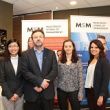Non-farm entrepreneurship in Africa: telling facts from myths
Maastricht School of Management (MsM) and Maastricht University researchers Wim Naudé and Paula Nagler are working on a path breaking project entitled “Agriculture in Africa at the Dawn of the 21st Century – Telling Facts from Myths”. The project is a collaborative effort between the World Bank Group, the African Development Bank, Cornell University, Yale University, the FAO and the Maastricht School of Management.
This project uses the new Living Standards Measurement Study – Integrated Surveys on Agriculture (LSMS-ISA), conducted in six African countries between 2005 and 2013, ‘to revisit the prevailing conventional wisdom about Africa’s agriculture and the livelihoods of its farmers.
Given rapid growth and urbanization, high and more volatile world food prices, and a changing climate, Africa’s agriculture operates in a new environment. At the same time, governments, donors and the private sector are taking a keen interest in African agriculture, with billions of dollars being invested’.
A thorough and updated understanding of African agriculture is needed to guide these investments, to establish baselines and to inform agricultural policy-making in Africa.
Participating researchers from the mentioned collaborators presented preliminary findings at the World Bank in Washington, and at the European Development Days in Brussels, in November 2013.
In a recent IZA Discussion Paper following these sessions, Paula Nagler (Maastricht University and MsM) and Wim Naudé establish, for the first time using comparable cross-country data on the household and non-farm enterprise level, that 40+ per cent of rural African households run non-farm businesses, bringing more than a third of income in some cases. About half of this work takes place in or around the home and about a fifth in a market. Almost all businesses are informal, mainly employing family members.
Related work done by the other teams in the project and presented at the European Development Days found that African women perform a lower percentage of work on farms than the disproportionately high share of around 60 to 80 percent held as common wisdom. The project is likely to overturn a number of currently believed ‘facts’ about African agriculture.
According to Luc Christiaensen, Senior Economist at the World Bank, as quoted at the European Development Days “Often the quality of African agricultural statistics leaves a lot to be desired…what we think we know is not necessarily based on such solid grounding.”

Two further researchers from Maastricht University are also working with Paula Nagler and Wim Naudé on this unique dataset: Nga Le Thi Quynh and Kristen Wharton.
| Nga Le Thi Quynh graduated from the National Economics University in Vietnam and is currently doing her Master degree in Public Policy at Maastricht University in the Netherlands with a High Potential Scholarship. She has more than three years of work experience as a consultant in development projects/programs in Vietnam. Her research interests include poverty reduction, inequality, gender empowerment. Her research using the LSMS-ISA “Agriculture in Africa” project data investigates the pull and push factors of female entrepreneurship and time dynamics of female-led enterprises in Nigeria. |
| Kristen Wharton graduated with a Bachelors of Arts in Art History and International Relations from Florida State University and a master gardener certification from the University of Maryland. Her interest in environmental sustainability and food security stem from working on agriculture and community greening projects in Florida, Maryland, and Washington, D.C.; Parma and Matera, Italy; and the communities of Meghauli and Daldali, Nepal. Her research using the LSMS-ISA “Agriculture in Africa” project data seeks to examine the correlation between cropping methods and nutritional outcomes among smallholder farmers in Uganda. |

Nga Le Thi Guynh, Wim Naudé, Paula Nagler, and Kristen Wharton.
Download the IZA Discussion Paper: Non-Farm Entrepreneurship in Rural Africa: Patterns and Determinants by Paula Nagler and Wim Naudé
Related MsM Reading:
MsM at the European Development Days 2013: Agriculture in Africa Today
Entrepreneurship in African Agriculture: Project Aims to Uncover Myths and Realities
Promoting Women’s Entrepreneurship: Which Policies & Practices Work Best?

